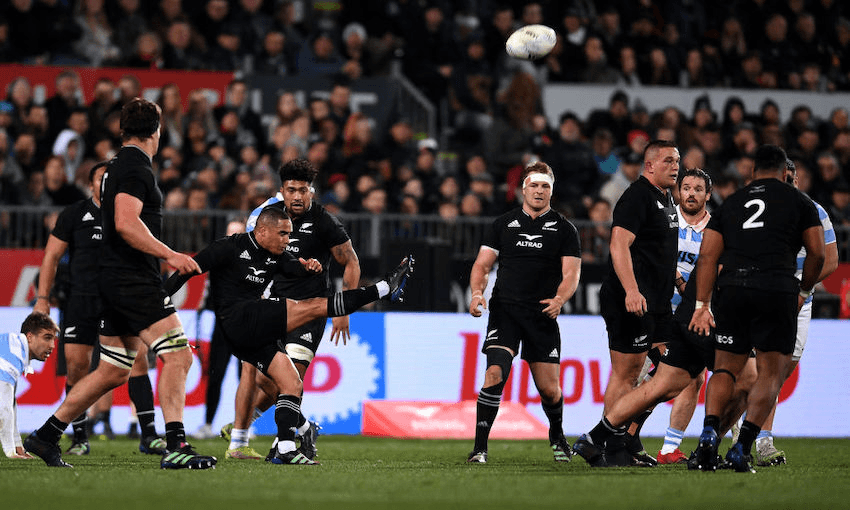It’s really not any more complicated than that.
This story first appeared on The Bounce, a Substack newsletter by Dylan Cleaver.
When covering a sport as complicated as rugby, which requires an intoxicating mix of technical, physical and strategic mastery to be the best, there is a tendency to make the unexplainable easy to digest.
So we lean on phrases that are both meaningless and universal. We talk about momentum shifts and of corners being turned. We make notes about selection continuity and coaching styles and philosophies. We put emphasis on playing narrow, with width or depth, depending on the occasion or opposition. The gain line, never forget the gain line.
We speak of playmakers, twin playmakers and difference makers.
The basics. We love the basics. You can put “the basics” behind any number of sets of words to give your report real heft: “Execution of…”; “Lacking in…”; “Commitment to…”; “Failure of…”; “Need to tidy up…”.
Scoreboard pressure is relatively new to the lexicon but is already a firm favourite, as is outside noise. A lot of time has been given to outside noise recently, specifically the blocking out of it, which leaves a rugby twist on the age old riddle: If a tree falls outside the All Blacks camp, does it actually make a sound?
Rugby is so damned hard to play well, so of course we try to simplify it and, in keeping with that spirit, the analysis of last night’s test will be cut back to the bone.
The All Blacks are not very good.
There. That’s it.
You might find this dismissive of both sides. While the goalkicking of Argentina’s Emiliano Boffelli was indeed magnificent and their defensive line under the tutelage of David Kidwell remained mostly unbuckled, I challenge you in a week’s time to remember a single thing they did with the ball outside the wonderful opportunist’s try to blindside flanker Juan Martin Gonzalez.
Los Pumas deserved their win because they scored more points than the opposition but they did this because…
The All Blacks are not very good.
Perhaps unfairly, this thought started to formulate 3000 km west of Christchurch, as an inspired but limited Wallabies side made short work of the defending world champion Springboks under bluebird skies in Adelaide.
In light of this, the thrilling win at Ellis Park a fortnight ago, the one that saved Ian Foster’s job, felt a little diminished. The corner turned seemed less a right angle and more a gentle curve.
Still, that curve was surely enough to beat an Argentina side that had never won in New Zealand and especially when the All Blacks were defending Christchurch turf for the first time in six years?
Joe Schmidt, the new attack master, was sitting in the box next to Foster. So too was Jason Ryan. His work with the forwards has been immediately evident, particularly on both sides of the lineout drive.
All the outward signs were positive.
For 39 minutes everything looked like it was going to plan but they became increasingly frustrated by Georgian whistleblower Nika Amashukeli, who admittedly looked like he was auditioning for a role rather than reffing what he saw in front of him, and they failed to adjust because…
The All Blacks are not very good.
Maybe all the talk about coaching is a smokescreen, although cunning Michael Cheika ensured it stayed in the middle of the room by talking up Scott Robertson. It could be a simple matter of a talent deficit compared to the two-time world champion iteration of the All Blacks.
Look through the squad and single out players that might be on the shortlist for what Richie McCaw would have labelled GAB status – great All Black.
There are not many.
There is Beauden Barrett, but the 2015-17 version of Barrett. There is Brodie Retallick, but the 2014-17 version of Retallick. There is Dane Coles, but the 2013-16 version of Coles.
There is Aaron Smith and Sam Whitelock, who have both maintained remarkable consistency to go with their longevity, but have a combined age of 66 and 243 tests of mileage of their chassis.
That’s probably it. Others might join the GAB ranks. Ardie Savea may, but probably not at No 8. He was specifically targeted by Argentina’s line speed and neutralised.
If you close your eyes and imagine best-case scenarios, maybe one of the young front rowers, or the extraordinarily talented but out of position Will Jordan, or the explosively talented but inconsistent Jordie Barrett, or the wonderfully gifted but too-often-inconsequential Richie Mo’unga.
Maybe.
For now, however, as we strap ourselves in for another week of navel-gazing while waiting for the inevitable “response” at Hamilton, it’s probably easier to admit the obvious.
These All Blacks are just not very good.




